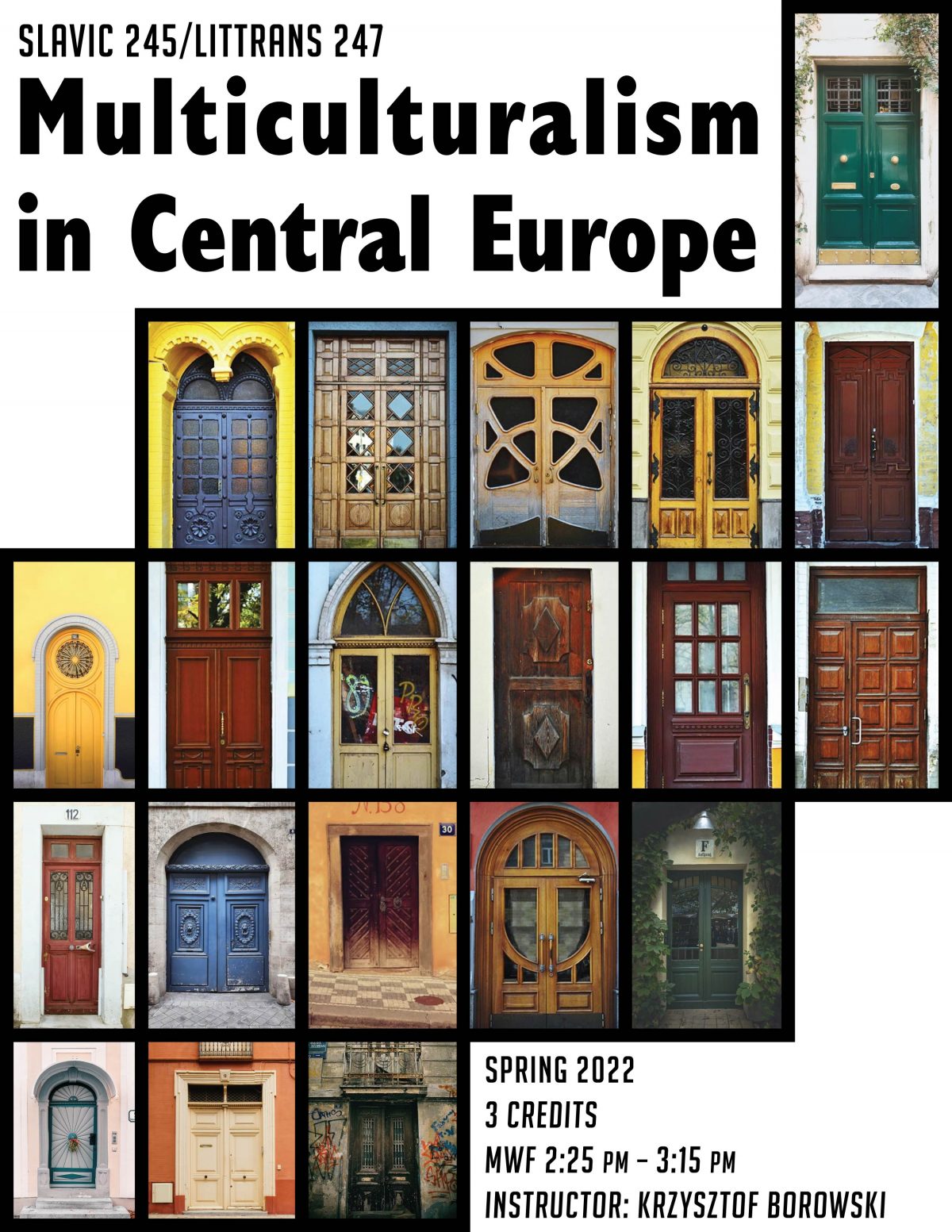
From Berlin to Białystok, from Vienna to Wolin—the map of Central Europe is full of places where multiple cultures, languages, religions, and traditions intersect. To document and promote this diversity, students in a new Slavic course completed a collaborative digital mapping project titled “Mapping Multiculturalism in Central Europe.” The project is now available for viewing and interacting on the UW Polish Studies program page.
» Search for all Polish language, literature, and culture courses at UW–Madison
Multicultural Central Europe, a new course taught by Dr. Krzysztof Borowski, was first offered in the Spring 2022 semester. The class attracted an interdisciplinary body of students from economics and finance to biology and computer science, all curious to learn more about the region and its history due to personal interests or family connections. During the 14 weeks, students explored the region through topics such as Germanic and Scandinavian heritage, Jewish presence, religious minorities, and Silesia as a modern-day borderland. The credits earned in this course count toward the Polish major (B.A., B.S.) as well as the Certificate in East Central European Languages, Literatures, and Cultures (ECELLC) offered through the Department of German, Nordic, and Slavic+.
For their final projects, students worked in groups on a collaborative project that maps diverse and multicultural stories from Poland and Central Europe. Each group focused on a specific location, researched its history, and created a digital presentation that combined text, photos, and videos using the Google Maps custom tool. The project description reads, “We hope that the project inspires you and the general public to learn, discover, and interact with the rich cultural heritage of Central Europe.” Selected projects are now available to the general public on the UW Polish Studies program page: https://go.wisc.edu/polish (Multicultural Central Europe section).
“We hope that the project inspires you and the general public to learn, discover, and interact with the rich cultural heritage of Central Europe.”
“Poland and the neighboring areas have been incredibly diverse through the centuries, yet we rarely talk about it,” says Dr. Krzysztof Borowski, who conceptualized and designed the course. “Growing up in Poland, I was taught the history of Poland as the history of Poles. You can imagine my surprise when I discovered that reality was much more complex. Once I started teaching, I wanted my students to realize that what we now call Poland has been home to many cultures, ethnicities, languages, and religions. Additionally, those traces persist to this day in the Polish language, customs, place names, and so on. That is why I developed this course, and I am grateful that it appealed to dozens of students across majors,” he said.
» Film & Music Event Explores Chopin’s Unknown Connection to the Americas
The course also featured four guest speakers who discussed topics related to the central theme. UW–Madison Slavic lecturer Dr. Oksana Stoychuk gave two talks: on the growth of Russian Berlin in the 20th century and multicultural places in her hometown of Lviv, Dr. Tomasz Grusiecki (Boise State University) talked about Polish carpets in a transcultural context, and Dr. Leszek Gardeła (National Museum of Denmark, Copenhagen) delivered a well-attended online lecture on Viking traces in present-day Poland.
» Was There a Viking Poland? Expert Discusses Archeological Facts and Myths
This is not the first time that students in the UW–Madison Polish Studies program completed final projects using digital technologies. In Fall 2020, students in the Polish American Cultural Experience course engaged with the topic through digital storytelling that extended beyond PowerPoint. Each project involved background research, information selection, and presentation of the collected material through digital means. Students examined Polish presence in both near (Chicago, Milwaukee, Oshkosh) and distant (Brazil, Colombia) locales in the form of blogs, websites, videos, and a podcast. Selected projects are now available to the general public on the UW Polish Studies program page: https://go.wisc.edu/polish (Digital Storytelling: The Polish American Experience section).

More from the #UWPolish blog:
Announcing 2022/2023 Lapinski Winners: Victoria Chowaniak and Julia Paciorek
Was There a Viking Poland? An Expert Discusses Archeological Facts and Myths
* * *
UW–Madison Polish Studies Program
Educating the Wisconsin public about the Polish language, literature, and culture since 1936.
The University of Wisconsin–Madison Polish Studies Program is the oldest academic program in the United States focused on the study and teaching of the Polish language, literature, and culture. UW–Madison Polish studies offer a comprehensive package of Polish language, literature, and culture courses, a generous scholarship program designed exclusively for its students, and various extracurricular activities each academic year.
The program, dating back to 1935, offers beginning, intermediate, and advanced Polish language courses, in addition to intensive Polish courses for heritage speakers and (under)graduate students. In 2011, the program received the prestigious Polonicum Award Distinction from the University of Warsaw for its achievements in promoting the Polish language and knowledge about Polish culture and history. The UW–Madison Polish program also offers a broad range of Polish culture courses on Polish film, contemporary Polish culture, Polish migration to the Americas, a survey of Polish culture from the Middle Ages to modern times, Polish comedy culture, and post-communism.
Each year, the UW Polish program awards scholarships for tuition through the Lapinski fund to undergraduate and graduate students studying the Polish language, literature, and culture. The Polish Student Association (PSA) provides a space for all students interested in events, activities, and learning about Poland and Polish culture. In collaboration with the Polish program faculty, the PSA also co-organizes the Madison Polish Film Festival, an annual celebration of Polish cinematography in Madison, Wisconsin, now more than 30 years old.